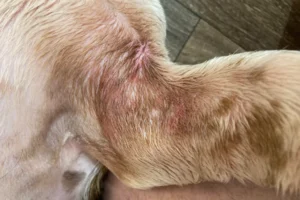Have you ever noticed that your cat scratch looks eerily similar to a mosquito bite? It’s a common observation among cat owners, but what exactly causes this phenomenon? Let’s explore the reasons behind why your cat scratch resembles a mosquito bite and what you can do about it.
The answer: While it may be alarming to see your cat scratch look like a mosquito bite, rest assured that it’s a common occurrence due to the similarities in how the two types of injuries present on the skin. However, there are specific reasons behind this resemblance that are important to understand.
Understanding the Anatomy of Cat Scratches
Cat scratches are small wounds caused by a cat’s sharp claws when they come into contact with human skin. These scratches can often appear red, raised, and itchy, resembling mosquito bites. The reason behind this similarity lies in the body’s natural response to both types of irritation.
When a cat scratches you, the skin becomes inflamed as the body’s immune system reacts to the injury. This inflammation is what causes the redness and swelling, giving the scratch a bumpy appearance similar to a mosquito bite. Additionally, as the scratch heals, it may become itchy, further reinforcing the resemblance to a bug bite.
It’s essential to keep cat scratches clean to prevent infection, as bacteria from a cat’s claws can easily enter the wound. Applying antibacterial ointment and keeping the scratch covered can help promote healing and reduce the risk of infection. If the scratch shows signs of infection, such as increasing redness, warmth, or pus, it’s important to seek medical attention promptly.
Cat Scratch Fever: The Connection to Bartonella
Cat scratch fever, also known as bartonellosis, is a bacterial infection caused by the bacterium Bartonella henselae. This infection can be transmitted to humans through cat scratches or bites, resulting in symptoms such as swollen lymph nodes, fever, fatigue, and headache. In some cases, cat scratch fever can lead to complications, especially in individuals with weakened immune systems.
The presence of Bartonella in a cat’s saliva or on their claws can contribute to the appearance of cat scratches resembling mosquito bites. The bacteria can cause additional inflammation in the skin, further intensifying the redness and swelling associated with the scratch.
To prevent cat scratch fever, it’s crucial to practice good hand hygiene after interacting with cats, especially if you have any open wounds or scratches on your skin. Keeping your cat’s claws trimmed and providing them with regular flea treatment can also help reduce the risk of infection.
Remember, if you develop symptoms of cat scratch fever after being scratched by a cat, it’s important to seek medical advice for proper diagnosis and treatment. For more information on Bartonella and its connection to cat scratches, you can visit the Centers for Disease Control and Prevention’s website here.
Why Does It Itch? Exploring the Irritation Factor
Have you ever noticed how both cat scratches and mosquito bites can be incredibly itchy? But why is that? Well, it all comes down to histamines. When your cat scratches you, tiny histamine-filled granules from their skin can be left behind, triggering an allergic reaction and causing that pesky itch. Similarly, when a mosquito bites you, it injects its saliva which also contains histamines, leading to that familiar urge to scratch. To alleviate the itchiness from both cat scratches and mosquito bites, you can try using antihistamine creams or taking an oral antihistamine.
And here’s an additional unique insight: did you know that scratching can actually make the itch worse? It may provide temporary relief, but it can also further irritate the skin and prolong the itching sensation. Instead of scratching, try applying a cold compress or using a gentle moisturizer to soothe the area.
Cat Behavior: Understanding Why Cats Scratch
To better understand why your cat’s scratches may resemble mosquito bites, let’s delve into the reasons behind why cats scratch in the first place. Cats scratch for a variety of reasons, including grooming, marking their territory, and stretching their muscles. When they scratch you, it could be their way of showing affection, playing, or simply trying to communicate with you.
Understanding your cat’s behavior can help you decipher why they scratch and how to prevent those scratches from looking like mosquito bites. Providing your cat with scratching posts, regular playtime, and positive reinforcement can help redirect their scratching behavior away from your skin.
Remember, cats scratch for a reason, and it’s essential to address the root cause to prevent those scratch marks from resembling mosquito bites. By understanding your cat’s behavior and taking steps to alleviate the itchiness, you can ensure a happier and scratch-free coexistence with your feline friend.
Home Remedies for Cat Scratches
If your cat scratches are starting to resemble mosquito bites, there are a few home remedies you can try to soothe the irritation. One effective solution is to gently wash the scratch with mild soap and water to prevent infection. Applying a cold compress can help reduce swelling and discomfort. Additionally, you can try using aloe vera gel or tea tree oil to promote healing and alleviate itching. Remember to keep the area clean and dry to prevent further irritation.
Natural Remedies:
- Coconut oil: Apply a small amount of coconut oil to the scratch to moisturize and soothe the skin.
- Calendula cream: This herbal remedy can help reduce inflammation and promote healing.
- Oatmeal bath: Soaking in an oatmeal bath can provide relief from itching and irritation.
Remember, if the scratch shows signs of infection such as redness, warmth, or pus, consult with your veterinarian for further guidance.
When to Seek Veterinary Care
While most cat scratches can be treated at home, there are certain situations where it’s crucial to seek professional veterinary care. If your cat’s scratch becomes increasingly red, swollen, or painful, it may indicate an infection that requires medical attention. Other warning signs include fever, lethargy, and loss of appetite. In cases of deep or jagged scratches, it’s best to consult with a vet to determine if stitches are needed to promote proper healing and reduce scarring.
In severe cases, some cats may develop an allergic reaction to a scratch, leading to symptoms such as hives or difficulty breathing. If you notice any of these signs, seek immediate veterinary care to prevent any further complications.
Remember, your feline friend’s health and well-being should always be a top priority, so don’t hesitate to seek professional help if needed.
Fun Fact: The Science Behind Cat Scratch Allergies
If you’ve ever noticed that your cat scratch looks like a mosquito bite, you’re not alone! Some people may experience allergic reactions to cat scratches, and there’s a scientific reason behind it. When a cat scratches you, their claws can leave behind proteins from their saliva on your skin. This can trigger an allergic reaction in some individuals, leading to redness, swelling, and itchiness that may resemble a mosquito bite.
One explanation for this phenomenon is that cats groom themselves by licking their fur, transferring allergens from their saliva to their claws. When they scratch you, these allergens can come into contact with your skin, causing a reaction. If you notice that your cat scratch looks like a mosquito bite, it could be due to an allergic response to these proteins.
To alleviate the discomfort caused by cat scratch allergies, it’s important to clean the affected area thoroughly with soap and water. Applying a cold compress or over-the-counter anti-itch cream can also help reduce inflammation and itching. If the symptoms persist or worsen, consult a healthcare provider for further assistance.
Remember, while cat scratches may sometimes resemble mosquito bites due to allergic reactions, it’s essential to differentiate between the two to determine the appropriate course of action for relief.
Tips for Managing Cat Scratch Allergies
- Keep your cat’s claws trimmed to reduce the amount of allergens transferred during scratches.
- Wash your hands after handling your cat to minimize exposure to allergens.
- Consult an allergist to identify specific triggers and develop a personalized treatment plan.
- Use hypoallergenic wipes to clean and soothe irritated skin after a cat scratch.
- Consider allergy testing to pinpoint any underlying sensitivities causing reactions to cat scratches.
By being proactive in managing cat scratch allergies, you can minimize discomfort and enjoy a harmonious relationship with your feline companion.
Alex, a passionate animal lover, has experience in training and understanding animal behavior. As a proud pet parent to two dogs and three cats, he founded AnimalReport.net to share insights from animal experts and expand his knowledge of the animal kingdom.




